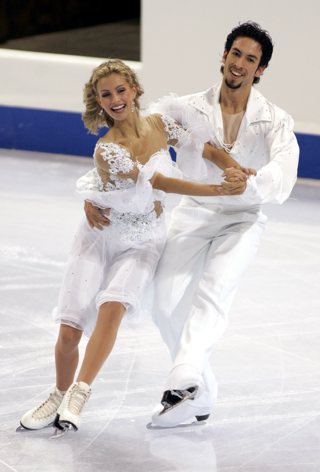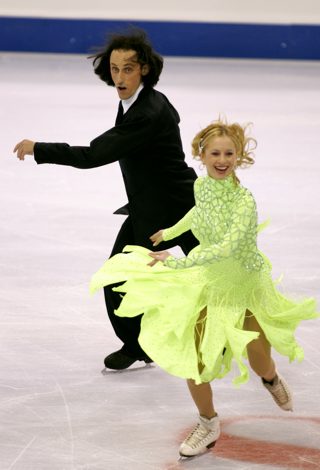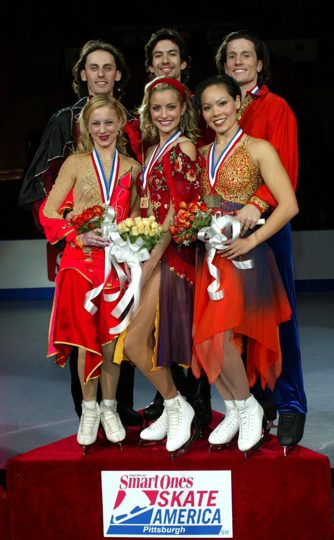|
The compulsory the ISU picked for this event, the Golden Waltz, was devised by Marina Klimova & Sergei Ponomarenko, working with their coach Natalia Dubova in Moscow, for the original section for their 1986-7 competitive season which culminated with Worlds in Cinncinnati. K&P had won the Olympic bronze in 1984 for the Soviet Union and were to win other Olympic events - silver in 1988 and the gold in 1992. The ISU has honored only a very few skaters with the request to convert their original to a compulsory. "They asked us to put the steps down on paper and we did. It is a fast dance but when we did it, it was six counts faster. All except maybe three of four steps are the same as we did," Ponomarenko explains. He believes compulsories are very important to the sport of ice dance. "I think they will be around for at least ten to fifteen years. It is the only way you can really compare the skating of the couples. "The most difficult part is to show the character of the dance. In very few couples would you know what dance they were doing if you turned off the music. They could be doing a Blues or a Tango. "The waltz is a very light dance. It should seem you are not touching the ice at all. The knee bend should not be as low as in the Blues and the stretch of the leg should not be higher than ninety degrees." Ponomarenko is now an experienced Technical Caller and was serving in this capacity in Skate America. "Iíve done three events last season and I think I will do five this time. It is a very difficult task. You have to concentrate fully. My eyes never leave the feet. I donít look at the skatersí faces at all. I donít even remember what they wear." The Golden Waltz was the second Russian devised compulsory. The first was the Tango Romantica, created by the first Olympic ice dance champions, Ludmila Pakhamova & Alexander Gorshkov (1976). An odd situation occurred in the 1998 Olympic Games where the Golden Waltz was a compulsory. The Canadian champions, Shae-Lynn Bourne & Victor Kraatz, who had won bronze medals in the previous two world championships, were only fifth in the Golden Waltz, the first of the two compulsories. The loss of those marks prevented them from winning the bronze medals. Since they were trained by Dubova, who had relocated to the United States, the Canadians felt they had been extremely well educated in this compulsory and deserved a higher place. It turned out that Bourne & Kraatz were doing a couple of steps wrongly because the ISU had made a minor change of which the Canadians were not aware. Following in Dubovaís footsteps, Klimova & Ponomarenko also moved to the United States. The married couple, who have two young children (the oldest is just beginning school), settled in California. They now both coach in San Jose. Competition Tanith Belbin & Ben Agosto skated third and easily took the lead. They were dressed completely in white and they have a slight appearance problem. His adorable sexy goatee and her wild hair exactly compliment their gypsy free but they are not in keeping with the elegance of a grand waltz. Nevertheless, they easily placed first both in technical elements (with a score of 19.90, 1.34 points ahead of the Israelis, Galit Chait & Sergei Sakhnovski) and in program components (which now have four categories for a compulsory Ė skating skills, timing, performance, and interpretation) of 23.81, 1.39 points ahead C&S. Belbin exuded good spirits. "The last time we skated this dance, we had only had about two weeks to train it because we did the Junior Worlds then went right to Worlds. Itís such a difficult dance so that wasnít enough time. It felt nice to be able to present it really well this time." Agosto said, "Weíre coming in as champions from last year but, at this point itís too soon to put pressure on ourselves. Itís the first competition of the season. We felt very good about all the elements. Itís a difficult dance but it felt great. We felt comfortable and confident with it." In turn the Israelis were significantly ahead of the third placed Canadians, Megan Wing & Aaron Lowe. Even before stepping on the ice, the flamboyant blonde, Svetlana Kulikova, dressed strikingly in brilliant red and her tall debonair partner, Vitali Novikov, in his black tails and white tie looked great. However, although the Russians took fourth place, their total element scores were lower than the fifth ranked Scottish brother and sister, Sinead & John Kerr. The Britons are trained by former world runner-up Joan Slater who said, "They are improving all the time. They are happy with each other and they have good rapport and thatís very important. This is always the one section that is most worrying for them." Kendra Goodwin & Brent Bommentre took ninth place. Their coach, Robbie Kane, said, "They were very composed. Their interpretation, feeling and expression was really consistent. This is the beginning of a journey for them. Theyíve only been together for 18 months." Bommentre said, "I like the fine technical aspects of the compulsory, but I like doing the free dance elements Ė the lifts and spins and things Ė better." Their teammates, Loren Galler-Rabinowitz & David Mitchell, did not have a good time and are lying tenth of the eleven couples from eight countries. Mitchell explained, "I had a piece of fabric stuck to the bottom of my blade, so the whole second pattern was bad. We had a similar experience at a Junior Grand Prix event. We stopped but the referee said we had to continue so we were afraid to stop this time. We told the referee (immediately after they completed the compulsory) tonight and she said that was unfortunate and that she would mention it to the judges." The fabric was not part of Galler-Rabinowitzís outfit. It was pink and might have come off one of the stuffed toys the enthusiastic if sparse crowd were throwing onto the ice after each performance. THE FOLLOWING IS BACKGROUND INFORMATION ON THE COMPETITORS 1. Belbin born: July 11, 1984 in Kingston, Ontario; Agosto b. January 15, 1982 Chicago, Illinois. They are the US champions and defending Skate America title holders. They were fifth in the 2004 World championships. Their coach is Igor Shpilband who trains them in Canton, Michigan. 2. Chait b. January 29, 1975 in Kfar-Saba, Israel; Sakhnovski b. May 15, 1975 in Moscow. They are many times Israeli champions and were seventh in the 2004 World championships. Chait, who was raised in New Jersey, competed in the 1994 US senior ice dance championships before representing the country in which she was born. Sakhnovski was the 1993 world junior champion with Ekaterina Svirina competing for Russia. They are coached by Tatiana Tarasova in Simsbury, Connecticut. 3. Wing b. November 1, 1975 in Vancouver, BC; Lowe b. October 12, 1974 in Vancouver, BC. They have been in the top three in Canada for over six years. They were 11th in their third world championship in 2004. They are coached by Igor Shpilband in Canton, Michigan. 4. Kulikova b. November 14, 1980 in Moscow; Novikov b. January 13, 1979 in Moscow. They were third in last seasonís Russian championships, and13th in the 2004 world championships. They teamed up in January 2003 winning the first competition they entered Ė the Nebelhorn Trophy in Oberstdorf, Germany, in October of that year. They are coached by Tatiana Tarasova in Simsbury, Connecticut. 5. Sinead Kerr, b. August 30, 1978 in Dundee, Scotland; her brother, John, was born June 2, 1980 in Edinburgh. They won last seasonís British championship deposing the holders and gained 14th place in their first world championship in 2004 where John created a sensation appearing at the closing banquet in the national dress of Scotland, a kilt. Because the sport of curling is very popular in Scotland, figure skaters are often at a disadvantage in getting ice time. The Kerrs are the first Scots to win the national ice dance title. They are coached by Joan Slater in Deeside. 6. Kauc b. February 2, 1980 in Lodz; Zych b. May 28, 1982 in Gdynia. After breaking up with previous partners, Kauc & Zych won the Polish national title and finished 24th at the 2004 world championships. They are coached by Maria Olszewska-Lelonkiewicz in Lodz and Kyrnica. Their choreography was done by Igor Shpilband & Marina Zueva in Canton, Michigan. 7. Golovina b. September 30, 1982 in Kharkov; Voiko b. March 25, 1980 in Kharkov. They are the second ranked Ukrainians who have finished 22nd and 21st in the past two world championships. They are coached by Rinat Farkhutdinov in Euless, Texas. 8. Bentley b. April 4, 1982 in Leeds, England; Pernet b. May 9, 1980 in Lyon, France. They are the fourth ranked couple in France. Bentley was British Junior champion with Andrew Hallam and competed with him in the World Junior championships for Britain but they trained in France, where Hallam had established himself with a previous British partner. When Hallam decided to go to Canada, Bentley decided to stay in Lyon and teamed up with Pernet. 9. Goodwin b. October 27, 1982 in Java, Indonesia; Bommentre b. b. May 10, 1984 in Chestnut Hill (Philadelphia), PA. They finished fourth in the 2004 US championships in their first season together. Both skated in the world junior championships with previous partners. They are coached by Robbie Kane in Philadelphia and Newark. 10. Galler-Rabinowitz b. January 19, 1986 in Boston; Mitchell b. April 23, 1982 in Ann Arbor, Michigan. They won the bronze medals in the 2004 US (Senior) championship, after winning the Junior title in 2002 and the Novice title in 2000 They are coached by Natalia Dubova in Stamford, Connecticut. 11. Romanovskaya b. December 3, 1984 in Moscow; Grachev b. July 28, 1984 in Moscow They won the world junior championship last season in their fourth attempt. They also won bronze and silver medal in the last two Junior Grand Prix finals. They are coached by Svetlana Alexeeva & Elena Kustarova in Moscow |
||||||||||||||||||||||||||||||||||||||||


